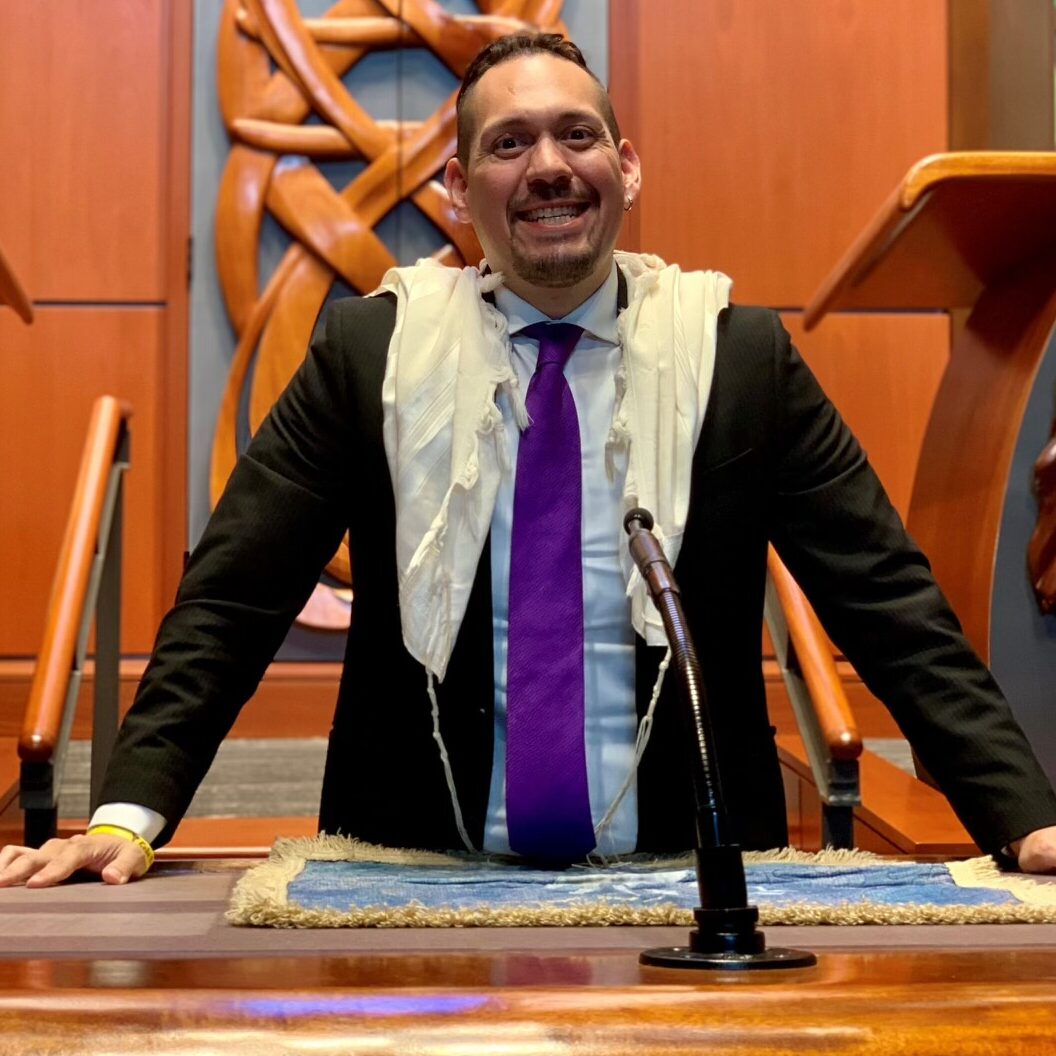“Hashem will provide” is a phrase that Micah grew up hearing from his father. As early as he could remember, Micah recalled knowing that his father believed those words—and Micah knew that he didn’t have the same faith that his father did, or at least not yet. A Columbian baby adopted into a rabbinic family, Micah was loved by his parents and always taught Jewish values. From an early age, Micah had a dialectical experience. He felt both different and a part of, and marginalized. He was both in the margins and in the center. Living in affluence, Micah was expected to be perfect…or so he thought. And so, Micah told a story of redemption—redemption from rigidity and stoicism to fluidity and authentic expression.
Micah was bullied for his weight gain. Kids made fun of him for being in a larger body, making events like pool parties sources of tremendous anxiety. Micah anticipated his Bar mitzvah with great trepidation. What if girls refused to dance with him? Refusing to take the risk, Micah wrote a letter to the DJ with a list of rules and regulations for the Bar Mitzvah’s flow. He explicitly stated that it was to exclude traditional dances such as the ‘snowball’ where kids join in and the potential for public humiliation could be heightened. While his Bar Mitzvah wasn’t the highlight of his middle school popularity, Micah did manage to become the co-captain of his day school’s basketball team. “Looking back on it, maybe in reality I wasn’t rejected as much as I thought I was.” Alcoholic thinking—it’s a disease of perception.
First-year football was a proper segue into integration with the ‘right crowds’ in high school, so Micah joined without hesitation. Attending a high school in an affluent area, Micah recalled how divided his locker room was. “There were the kids from my neighborhood and then there were the kids that were bussed in from inner-city Saint Louis.” There was a sense of separation between the two groups, and Micah wasn’t having it. He moved his locker to the side of the room with the inner-city kids. Micah speculates that it was his internal sense of being different. Even though it had gone from the forefront of his mind to his subconscious, the influence was still there. Micah was both in the margins and the center, rejecting people who rejected people.
In high school, Micah rose from freshman football to senior Mr. Sadie Hawkins Nominee. But he realized he was learning to take shortcuts and rest on his laurels at times, too. His grades were good but not exceptional. Micah’s Mom leaned in with tough love and told him that if he wanted to go to school for the smartest students, he couldn’t settle for mediocrity. Micah doubled down and was accepted to every school he applied to. He attended his first choice, Columbia University.
Ah, to go to school in the Big Apple. He joined a Jewish fraternity and was on their executive board, he was on the student council and even served as student body president. Micah credentialed himself as if reading names out of a phone book—he didn’t boast. Micah was an objectively accomplished man. One who notably mentioned one single failure; he was rejected from a university acapella choir. This failure wasn’t just notable because it was uncommon for him, it was notable because of his relationship with it. It was “an opportunity to jump into other things.” A lesson to give us pause.
But what of his drinking and drugging? “Greek life didn’t help.” I think the pressure was building slowly over time. The pressure of being the fixer. The pressure of being the Rabbi’s son. In retrospect, it seemed that Micah grew up in the shadow of his father’s light. There was a paradigm ingrained in him in which his actions were a direct reflection upon the family—upon his father’s reputation as a religious leader. He didn’t blame his parents, but the pressure was felt, it was strongly implied—and that was enough.
Micah’s closet drinking was a coping mechanism and catharsis in the beginning. It was a way to take off his mask while keeping another on. It was also a cry for help. He had spent the bulk of his life putting others first, or at the very least, taking care of others and himself simultaneously. After university, Micah set aside his ambition to pursue law school and decided to follow in his father’s footsteps and become a Rabbi. Micah made it to a significant position as Rabbi of a large congregation in Atlanta. He took his wisdom, talent in oration, and gnarly, clandestine alcoholism with him.
Eventually, things fell apart. The temple position became a memory. Micah was faced with an intervention and an ultimatum. Rabbi Mark, along with his parents and ex-wife, established the necessity of treatment. He realized that he had exhausted all other options and that he was too exhausted. This was not his first intervention, but it was his last. Micah’s drinking had gotten to the point that he was engaging in terrible arguments with people that he was closest with, “not just strangers at the bar,” but the people who cared for him the most. It was keeping him up at night. He was present but absent. He had become a shell of himself. So, he decided to surrender.
There were three stairs that stood between Micah and the doors of Beit T’Shuvah. With each climb, Micah completed steps one, two, and three (particularly considering the fact that he found his sponsor at his very first in-house BTS Alcoholics Anonymous meeting). Micah still works with his sponsor today. This guy really knows him, and he really knows this guy which has led to a transformative experience through his fifth step. Micah realized that he has a very strong ‘manager’ part to his personality. The mask that he wore became corrosive. It was eroding the very fabric of his being. People pleasing had become self-destructive, but things were beginning to change.
Today, Micah has a much different relationship with his parents. Somewhat paradoxically, perhaps, things are more difficult at times, because Micah is no longer a muted version of himself. He has set aside his manager part and committed to showing up authentically. Micah just moved out of Beit T’Shuvah, and so, he is our Spotlight Alumnus, of whom we are very proud. He is now living in a sober house nearby and has taken a job as a behavioral health technician working for the Los Angeles Unified School District. At various points through the spotlight interview, Micah was asked to set aside his manager part in real-time. It’s still a daily battle. It’s shedding a layer he’s worn for all his life, but he’s doing so… One day at a time. Micah has fears like the rest of us—fear of the pay cut he will undoubtedly face, uncertainty regarding his future, but his love for his daughter fuels him. Their love for each other is a guiding light.
Micah smiles as he recalls his father’s wisdom. He has experienced a psychic change through the twelve steps of AA and his irreplaceable journey at Beit T’Shuvah, which brought him back to living authentically. H knows now— ‘Hashem will provide.’

